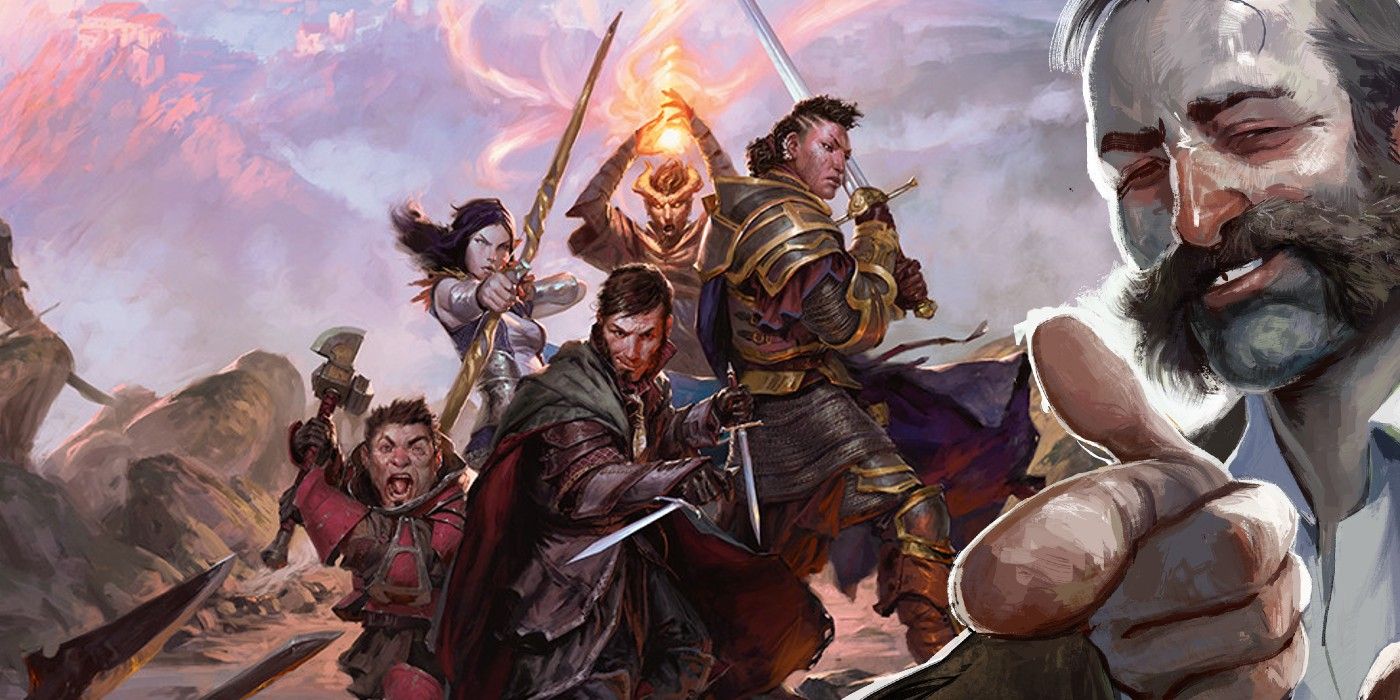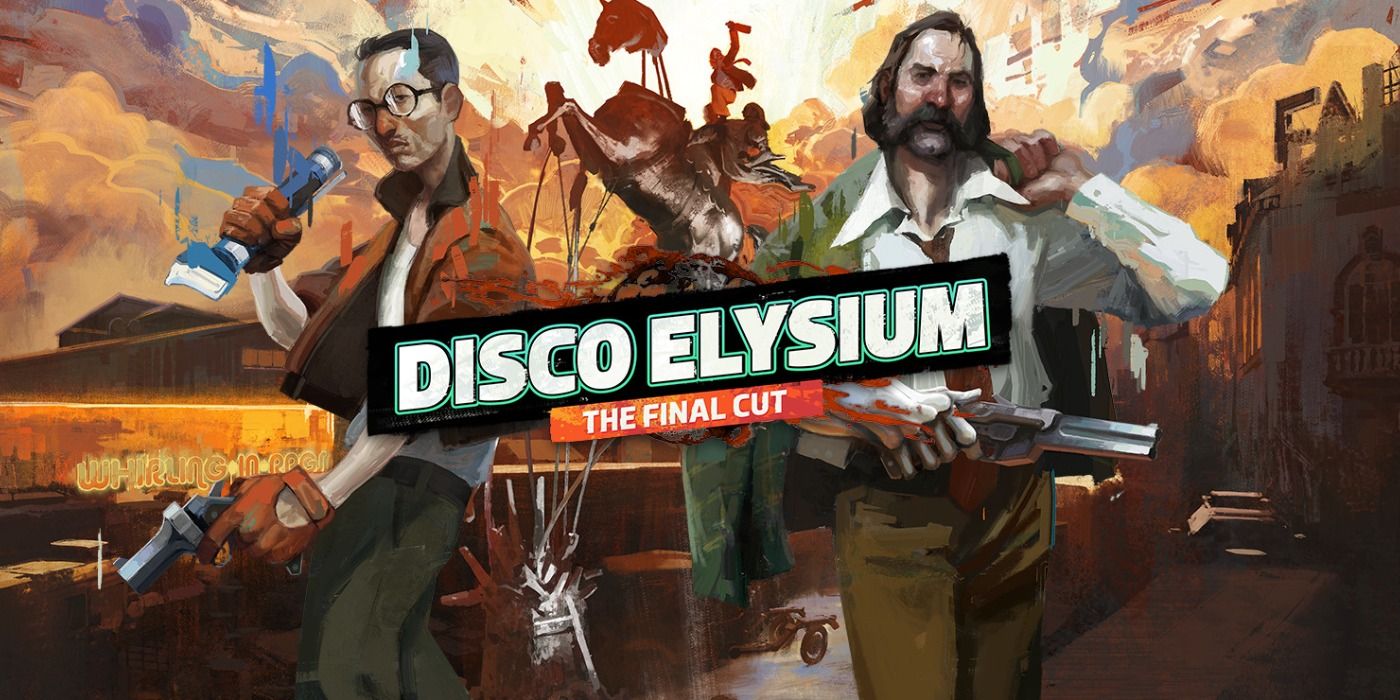The 2019 release of Disco Elysium raised the bar for writing in RPG video games, and given its clear homages to tabletop RPGs, Dungeon Masters can borrow some of the Disco Elysium’s unconventional approaches to make Dungeons & Dragons campaigns better than ever. Unlike D&D, combat is not the focus of Disco Elysium as there are few opportunities for players to solve problems with fisticuffs or gunplay. Instead, the game focused on skills, and it used those skills in unexpected ways, a technique DMs can copy to enrich D&D. Although Disco Elysium is a scripted work, the sheer volume of branching possibilities presented by the game offers an ideal rendition of a well-prepared DM who is also comfortable with thinking on the fly. By emulating the Disco Elysium approach to skills, as well as the developers’ thoroughly fleshed-out scenario planning, DMs can give their campaigns a bit of Disco style, which includes allowing for spontaneous humor and player agency to ensure every session is memorable.
Drawing from Disco Elysium for a Dungeons & Dragons game is appropriate since Disco Elysium evolved from the homebrew D&D campaigns its creators played into a landmark video game. The mechanics of Disco Elysium resemble a tabletop RPG, one that uses two six-sided dice instead of the iconic d20 of Dungeons & Dragons. Disco Elysium relies entirely on skill checks to resolve all forms of mental, social, and physical conflict. Since the 3.0 version of D&D the game has contained a universal skill system for all player characters, unlike prior editions that had no skill system, or when Advanced D&D contained one set of mechanics for its “non-weapon proficiency” system alongside percentile-based mechanics for Thief-exclusive abilities. D&D’s systems for skills are far leaner than the complex rules for combat resolution, even in the current streamlined 5e rules.
The focus on battle makes sense, as D&D is first and foremost a heroic fantasy game where combat is expected to take the center stage. Disco Elysium pays homage to non-D&D TTRPGs in its mechanics, evoking the vibe of skill check-focused systems like Call of Cthulhu and Vampire: the Masquerade. These games tend to put less emphasis on combat, like Disco Elysium, where violence is just another skill check, and one is far less likely to see much use when compared to mental and social-oriented skills. D&D offers Dungeon Masters plenty of tools to make combat interesting. Taking cues from Disco Elysium can bolster the weaker parts of the D&D ruleset, namely the game’s skill system for all challenges outside of battle. This can make the time spent out of combat as exciting for the players (and the DM) as any high-stakes battle - if properly executed.
Disco Elysium's Flexible Approach To Skills Can Improve Dungeons & Dragons
In D&D skills have tightly defined uses. There are D&D skills players rarely invest in, as they are unlikely to see much use in a typical campaign. The Perform skill, for one, often seems useless to characters who are not Bards, but DMs who borrow from Disco Elysium can change this. Disco Elysium’s Drama skill seems, at first glance, to be the game’s analog for both Deception and Perform from the D&D skill list. Beyond the occasions where the game prompts the player to use Drama to deceive someone else, there are just as many where it informs their understanding of theatricality. The D&D Insight skill is typically used to read body language and gauge the honesty and intentions of another character. Allowing Perform to function like Disco Elysium’s Drama skill, where it can also help a player recognize when someone is putting on an act, makes the D&D skill system more versatile and interesting.
Some veteran TTRPG hobbyists are familiar with the “locked door problem” of game design. This occurs when a DM prepares a scenario where a door must be unlocked for the story to advance, and if the party cannot succeed in a specific roll (a Thieves’ Tool check in 5e D&D rules) the story cannot move forward. Outside of combat, a skill master is one of D&D’s optimal builds. These characters excel in a variety of skills to help avoid the locked door problem from stalling out progress in the game. Playing through Disco Elysium shows a DM there are better ways to avoid this design flaw. Getting past a guard outside of the Martinaise union offices can be accomplished through rhetoric, exerting authority, or finding an alternate means of entry through savoir-faire. DMs should apply this to their own game session preparation, ensuring that they allow multiple approaches to any given obstacle, while also allowing for player ingenuity.
Using Disco Elysium’s more flexible applications of skills also avoids the scenario where the game cannot proceed simply because the player did not have “the right skill.” The best skill proficiencies for new D&D players include Perception, the game’s catch-all for all manner of sensory observation, alongside Insight for every kind of social analysis. Both skills have passive levels that provide the player automatic feedback without the need to roll, per D&D’s rules. Outside of simply feeding players information based on high passive skill levels, DMs should reward players who think creatively. In Disco Elysium the Authority skill functions as more than the game’s version of Intimidate, but also gives the player an intuitive understanding of systems of power and control. Rather than solely relying on passive Insight, a player should be rewarded for suggesting an Intimidate check to recognize who calls the shots when encountering a rival group.
Disco Elysium Teaches D&D DMs To Be Prepared, But Adaptable
Rethinking the approach to D&D’s skill system, by offering active uses for passive checks like D&D’s Perception skill, and analysis options for typically “active” skills like Intimidate or Perform, is just one technique a DM can borrow from Disco Elysium. DMs can also adopt approaches from the player-facing options Disco Elysium provides (and those it does not). Some RPG analysts believe a DM should always say yes to any player-suggested actions. There are times when inexperienced players who are still reveling in the freedom offered by tabletop RPGs might take actions that seem completely out of character. Though it is scripted, many moments in Disco Elysium feel like a skilled DM reacting to an unpredictable player. The game’s protagonist might declare “I am the law” without context to one NPC, and then describe themselves as the "harbinger of doom" as a complete non sequitur to the next. The game allows for this, and the deadpan reactions from the hero’s partner Kim Kitsuragi rank among Disco Elysium’s funniest moments.
While a Dungeon Master can roll with the punches of a few quirky player choices and might find themselves impressed by an unexpected approach to a complex problem, there are times when a D&D player might suggest an action that is entirely out of character and could derail the entire campaign. There is a certain allure to playing the one evil-aligned character in a D&D party that is otherwise composed of neutral and good characters. A mature gaming group can handle this sort of diverse alignment group, but inexperienced players often overplay the chaotic nature of chaotic alignments or fail to recognize that even evil characters control their impulses when they have sufficient motivation. Early in the story of Disco Elysium the character of Cunoess, the unnamed friend of the foul-mouthed youth Cuno, might agitate the player character while they are holding a firearm. Shooting an unarmed child is extremely out of character for the protagonist, even if they are being verbally tormented. The game requires an extremely high difficulty Composure check to execute the shot, not a check based on Hand Eye Coordination, the game’s skill for most firearm usage.
A Dungeon Master can apply this technique to D&D when a player wants to publicly slay a noble who annoys them, or openly rob a weapons merchant in a large city-state, by requiring a very high difficulty Charisma saving throw to represent the character acting against their own better judgment to allow greed or passion to overcome logic, ethics, or self-preservation. There are many fun D&D character build ideas for evil characters, but they should still be fully realized characters, not thinly drawn excuses for arbitrary troublemaking. Aside from the mechanical impediment to the action, it will likely prompt the player to think more from their character’s perspective, instead of from the view of a player treating the game like a consequence-free playground. Using any of these techniques can help a Dungeons & Dragons game become just as immersive, funny, and unpredictable as Disco Elysium, a video game that prompts many DMs to step up their own game in how they run their campaigns.



